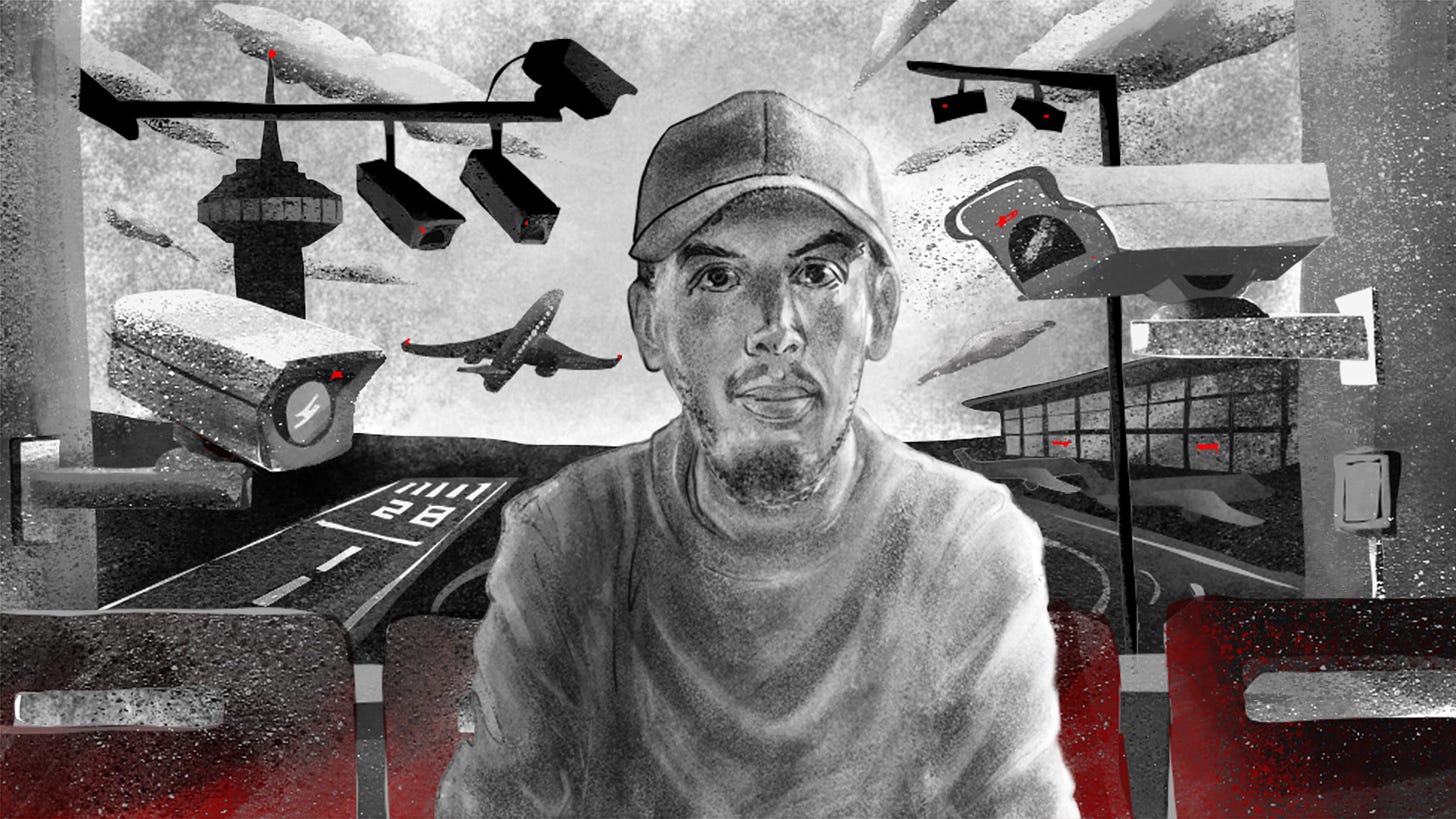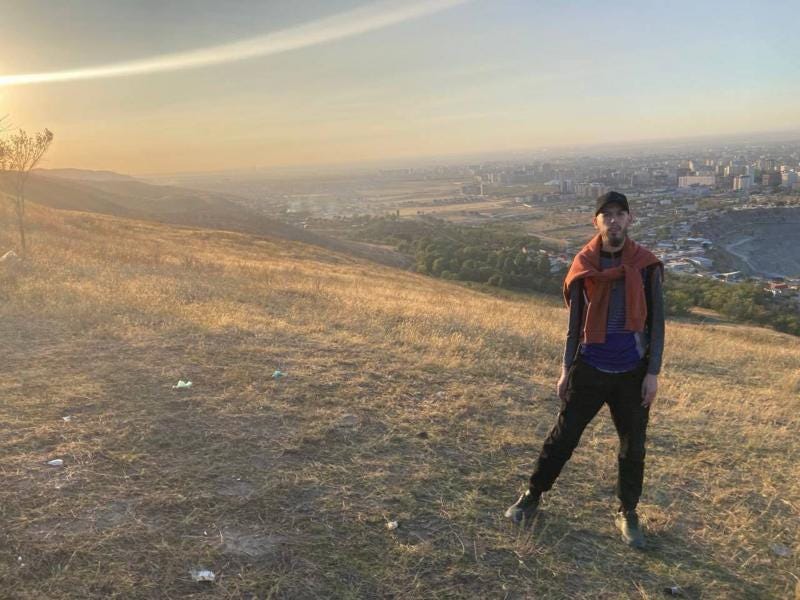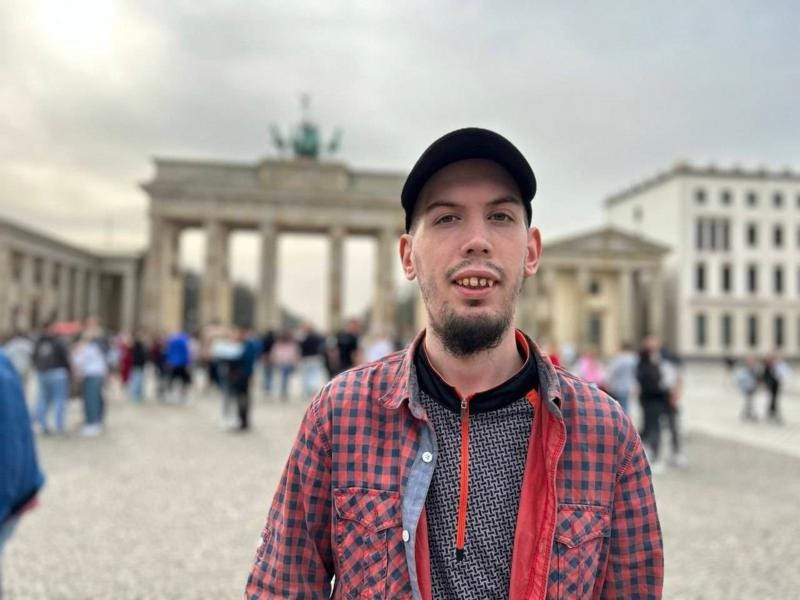“Don’t cry, we’re sending you back to Russia:” The precarious life of Russian political exiles and deserters in neighbouring states
BBC has been speaking to Russians who've fled the country and to activists from the underground network of NGOs set up to help them escape and start a new life abroad.
By Amalia Zatari.
Since the start of the full-scale Russian invasion of Ukraine, many Russians have fled to Kazakhstan, Kyrgyzstan and Armenia – countries which allow them to enter without a visa, and on an internal rather than a foreign travel passport. But close ties between these states and Russia – particularly in the field of intelligence-sharing, means the risks to new arrivals are growing. BBC Russian has been speaking to some of those who have escaped and to activists from an underground network of NGOs set up to help them leave Russia and to facilitate their onward travel to a new life in Europe.
Lev Skoryakin, a 22-year-old anarchist from Moscow, fled Russia for the first time in the autumn of 2022. He had just been released on bail after six months in pre-trial detention, on charges of taking part in an anarchist protest outside an FSB building.
Skoryakin maintains he was not involved in the protest, but despite this says he and a friend, Ruslan Abasov, were detained by the police and beaten into providing a false confession.
Knowing the hooliganism charges he was facing could result in up to seven years in jail, Skoryakin decided it was time to leave.
Because he was only out on bail, the authorities had not returned his foreign travel passport. This meant his only option was to travel to a country which would allow him to enter on his Russian internal passport.
He chose Kyrgyzstan.
Escape networks
Skoryakin was helped by a charity called the Rapid Response Unit, one of several Russian NGOs helping to provide an escape route to Russians wanted by the authorities or fleeing military service.
Rapid Response Unit bought his tickets and found him somewhere to stay in Bishkek. The organisation told the BBC that they have helped around 200 people to leave in the past two years.
Skoryakin’s friend Ruslan Abasov also fled Russiа and his escape was facilitated by another NGO called Vyvozhyk. A spokesperson told the BBC that Vyvozhyk had helped 110 people who were “under investigation, or in high-risk situations” since it was set up in October 2022.
“There can be multiple people involved in a criminal case,” the source told the BBC. “Sometimes we evacuate “the whole case” at once – we get all the defendants out. Sometimes we bring their partners or children too.”
Wanted lists
Although Skoryakin could breathe more freely in Kyrgyzstan – he still didn’t feel completely safe.
Kyrgyzstan, Kazakhstan, and Armenia, along with Russia, Belarus and Tajikistan are all members of a regional bloc called the Collective Security Treaty Organisation (CSTO) and as such are required to share information about wanted persons.
All Russians on the wanted list - civilians and military deserters- know that sooner or later, their names will be shared with other CSTO member states.
Until recently Kyrgyzstan was seen as a relatively safe bet by many people fleeing Russia because it tended to take longer to update its records when other CSTO countries filed wanted reports.
This was in stark contrast to neighbouring Kazakhstan which has carried out some high- profile deportations – in late 2022 for example an FSB major called Mikhail Zhilin who had fled to escape mobilisation, was detained and deported back to Russia, where he was promptly sentenced to six and a half years in a penal colony for desertion.
Low profile
Skoryakin moved into a room rented under a friend’s name in the Kyrgyz capital, Bishkek. He tried to keep a low profile and didn’t interact with other new Russian arrivals.
“It was a deliberate move, so they wouldn’t tell on me if they were caught, and vice-versa,” he explains.
At this stage another NGO stepped in to help him.
InTransit wаs set up in March 2022 by Russians living abroad, mainly in Germany.
“[We] help people who are persecuted in Russia and simply disagree with the war with leaving the country and processing documents," a spokesperson told the BBC, on condition of anonymity for security reasons.
InTransit has evacuated 70 people from Russia in two years, and helped at least 465 Russians obtain European humanitarian visas.
Ersatz passports
After the invasion of Ukraine, many European countries made it harder for Russia citizens to get Schengen visas; and some like Poland, and the Baltic states, stopped issuing them entirely.
This mаde it much more difficult for Russians fleeing political persecution to travel to countries where they could apply for asylum.
Some European states do issue humanitarian visas to Russians in this situation. But things are even harder for people who have had to leave without their foreign travel passports.
For them the only option is to apply for special travel documents in order to reach a country where they can stay to become a resident.
Activists say only two European countries regularly issue such documents - France and Germany. The French version is called a’ laisser passez,’ and the German – an ‘ersatz passport’.
“Before so many Russians started needed them, nobody had heard of ersatz passports,” an InTransit member told the BBC. “When somebody turns up with one, the German migration police are sometimes struck dumb, they don’t recognise it.”
The first Russians to reach Germany on ersatz passports were four opposition journalists who travelled via Armenia, in August 2022. The InTransit source says that despite the urgency of their case it still took two months to get all the necessary paperwork approved by the German authorities.
Worst nightmare
By the spring of 2023 Lev Skoryakin had applied for a German humanitarian visa and was waiting for a call from the German consulate. But in June his worst nightmare happened when the local police turned up at his home and arrested him.
Skoryakin was placed in pre-trial detention pending an extradition hearing.
He immediately filed a request for asylum, and in the meantime lawyers from InTransit made frantic calls to the German consulate to try and get him a humanitarian visa.
The Germans made him a priority case, an ‘ersatz passport’ was issued with a humanitarian visa, and in September Skoryakin was released from detention and went to pick it up.
But before he had a chance to use his new documents, the Kyrgyz police were back at the hostel where he was living, and this time things were even more serious.
Skoryakin was put in a police vehicle and driven to Bishkek airport. On the way the car stopped to pick up another official who gave him back his internal passport.
“Don’t cry” he was told, “We’re sending you back to Russia.”
Skoryakin flew back to Moscow on a regular flight, handcuffed and accompanied by guards who didn’t speak a word to him the entire journey.
At Moscow’s Domodedovo airport, he was taken into a room and beaten up by FSB operatives who demanded the code to unlock his phone. His interrogators wanted to know who had helped him to leave Russia and kept asking him about another organisation called The Ark, that at that stage he hadn’t heard of.
Skoryakin was taken to Moscow’s Butyrskiy prison where he stayed for three months until his case came to court. To his surprise he was let off with a fine, and in early 2024 he left Russia again – this time to Armenia.
He arrived with no documents except his Russian internal passport, and so he had to start the process of obtaining an ersatz passport and humanitarian visa all over again.
Ironically this time he was helped out by The Ark, the very organisation the FSB had been so interested in. They helped him find a place in a hostel, and when his new German documents finally came through in March 2024 he was finally able to leave for Berlin.
Facial recognition cameras
Skoryakin’s case was one of several which sent a wave of fear through the Russian émigré community in Kyrgyzstan. Why had a place which everyone had assumed was relatively safe, suddenly become so risky?
Skoryakin’s case was a direct result of Kyrgyzstan beginning to implement new facial recognition technology on CCTV cameras across Bishkek, say experts from the InTransit NGO and local human rights activists the BBC has spoken to.
The ‘Safe City’ system was installed by a company with close ties to the Russian state, and it came pre-loaded with the records of over 85,000 people on Russia’s interstate wanted list.
Local human rights activists say one of the first Russians to fall victim to the new system was a young man called Alexei Rozhkov, who was wanted in Russia for setting fire to a military enlistment office in the city of Berezovsky.
In June 2023 Rozhkov was detained in Bishkek, driven to the airport, and handed over to Russian security officials. Back in Russia, the arson charge he was already facing was upgraded to terrorism and additional charges were pressed for spreading fake news about the war in Ukraine. He is now in pre-trial detention and could face more than 22 years in prison.
The BBC sent multiple enquiries to various Kyrgyz law enforcement and security bodies, about Lev Skoryakin’s case. The Prosecutor General's Office said they had decided not to extradite him to Russia, and knew nothing about his whereabouts following his release in September 2023. The BBC also asked the Kyrgyz National Security Committee why someone who had requested political asylum in Kyrgyzstan was deported to Russia in contravention of international law. We have not received a reply.
Deserters
While Russians fleeing political persecution can hope to eventually receive permission to relocate to Europe, the situation is much more complicated for people who have deserted from the Russian armed forces.
Grigory Sverdlin heads the NGO Go Through the Forest, which helps Russian deserters escape the country. He told the BBC there are now more than 400 deserters living in CSTO member states.
“Half of them were mobilised, 40 percent are contract soldiers, and the other 10 percent are conscripts, officers, and so on,” he says.
Deserters don’t meet the grounds for European humanitarian visas. There is no special provision for them and many concerns and sensitivities about how to deal with them.
“There are different kinds of deserters,” the NGO InTransit explains. “There are those who actually went to Ukraine and killed people, and those who fled the army before reaching Ukraine. All this is complicated – in terms of the international situation, and in terms of what the Ukrainians will say. And the European authorities have fears about Russian spies and agents, fears about letting too many people into Europe who know how to use a weapon.”
Activists hope there may soon be some movement on this issue, but they predict that this may be limited to France.
“Unfortunately, there’s still nothing from Germany. There’s a sense that there’s slightly more political will from France.”
The only Russian deserter known to activists who reached Germany is a former Russian army artilleryman who refused to fight Ukraine because of his Ukrainian heritage. Having left Russia for a CSTO state, he found a job in the German IT sector, applied remotely, and moved there on a work visa.
This deserter was helped by the combined efforts of InTransit, the Kazakhstan Human Rights Bureau and a migration lawyer in Kazakhstan, activists told the BBC.
He declined to speak to the BBC.
Deserters today, dissidents tomorrow
After receiving a German ersatz passport or a French laisser-passer, Russian political refugees have one final hurdle to cross.
Because they are officially on the wanted list, when they attempt to leave the country the CSTO database will flag up their names and local border guards will be obliged to detain them.
In order to prevent this happening, activist groups have to negotiate with the local authorities in each particular country. The process is different in each place, and because of the sensitivities involved, the activists who spoke to the BBC asked us not to reveal the details.
After Aleksei Rozhkov and Lev Skoryakin, were deported from Bishkek, the Rapid Response Unit NGO says it has stopped sending Russian exiles to Kyrgyzstan and now sends them to Armenia instead.
Other activists interviewed agreed that Armenia is now the safest of the three countries for Russian exiles. A source from Vyvozhuk, the group that helped Skoryakin’s friend Ruslan, says the group is now evacuating Russians without passports exclusively to Armenia.
“Armenia still seems a bit safer than Kazakhstan, nobody has been deported from there yet,” says Grigory Sverdlin from the Go Through the Forest NGO. But he stresses that this is only the case for political cases, and not for military deserters.
At the end of 2023 a Russian army deserter called Dmitry Setrakov, was detained by Russian soldiers in Armenia, taken to their base in the town of Gyumri and then flown back to Russia where he now faces up to 10 years in prison, Sverdlin says. In April 2024 another deserter disappeared in Armenia under similar circumstances.
InTransit are worried these two cases could start a wider precedent and are urging the authorities to act before it’s too late.
"In both cases, deserters were abducted. But once the kidnappings start, it’s deserters today and dissidents tomorrow. We think the Armenian government – any government – should be preventing abductions from its soil of the people fled who Russia for disagreeing with its political course and the war it is waging."
Read this story in Russian here.
Translated by Pippa Crawford.
Edited by Jenny Norton.
Illustrations by Denis Korolev.









